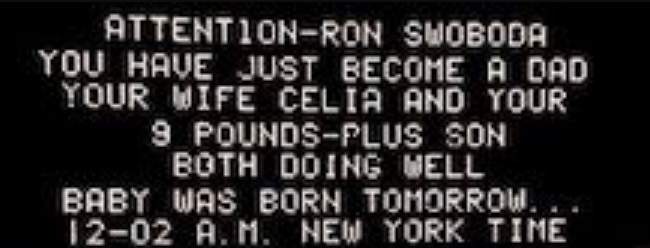The Weekender, July 24, 2020

Hi!
As long-time readers know, I’m a huge baseball fan, and more specifically, of the New York Mets. Today’s Opening Day for the Mets, and — don’t worry, this isn’t a note about baseball! — as a result, all things Mets are high on my radar.
Long-time readers also know I realy enjoy the quirks caused by time zones. As I’ve mentioned before, I went to high school with someone who shares my birthday, but I was born in the morning and he was born in the early afternoon. And yet, he was born before I was — even though my birth certificate suggests otherwise, he is older than I am. He was born in Spain, I was born outside New York City, and there’s a six-hour time difference.
I mention these two things because I came across the following image this week. It’s a fun fact, one that doesn’t warrant a full article, so I’m sharing today.

That message came across the Dodger Stadium scoreboard on July 22, 1966. The Mets were in Los Angeles that evening and a 22-year-old outfielder named Ron Swoboda was in the Mets lineup. At 9:02 PM local time in Los Angeles that day, Swoboda’s wife, Celia, gave birth to a baby boy. Ron Jr.’s date of birth, therefore, was July 23rd — the next day, from Ron Sr.’s perspective. The scoreboard operator let the outfielder know of the new arrival via the message seen above, and as it correctly states, the “baby was born tomorrow.” Pretty neat.
For you baseball fans out there, here’s the box score and game log from that game. You’ll note that Swoboda hit a two-run homer in the 8th, and that the game ran two hours and 26 minutes. The game started at 8 PM Los Angeles time, so there’s a good chance that Ron Sr. hit a home run in his first at-bat after his son was born, and yet, did so the day before he was born, too. (I tried to find a newspaper article that spoke to this point, but neither the AP story nor AP columnist Murray Chass mentioned Swoboda’s wife or newborn son.)
The Now I Know Week in Review
Monday: International Wallyball. The (now defunct) volleyball game played in the United States and Mexico, at the same time.
Tuesday: Winneconne Day: The map that led to a brief stint of independence (and an annual pancake breakfast!).
Wednesday: Knuckle Head: The really weird experiment to disprove a knuckle-cracking myth.
Thursday: When Bread Breaks Arms. Unrelated, we had some stale bread in the house last week and it could have been used as a weapon.
And some other things you should check out:
Some long (and short!) reads for the weekend.
1) “An Oral History of Big Mouth Billy Bass” (Mel Magazine, 18 minutes, July 2020). If you know what Big Mouth Billy Bass is, you’ll really like this. If you don’t know what it is, you’re going to be amazed this thing even exists — and then, you’ll really like this.
2) “Raising the World’s IQ” (New York Times, 4 minutes, December 2008). This is a short read about something you probably haven’t thought much about before. I read it when it came out in 2008 and the thought stuck with me since.
3) “Demand for ginseng is creating a ‘wild west’ in Appalachia” (National Geographic, 18 minutes, January 2020). The mere fact that there’s an 18-minute read on ginseng should be enough to pique your interest.
4) “How the Ice Cream Truck Made Summer Cool” (Smithsonian, 3 minutes, July 2020). A brief-ish history of the Good Humor ice cream truck. Thanks to reader John G. for the suggestion.
Have a great weekend!
Dan
